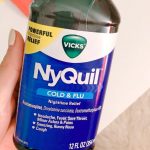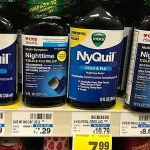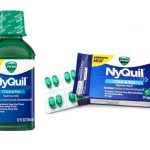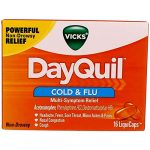How Long Does Nyquil Last After A Dose?

When our body begins to metabolize a medication, different organs process the ingredients before they are finally released into the bloodstream. While the process may sound straightforward, different drugs dissolve at different rates, different formulas, and dosages break down differently – and, everybody’s body metabolizes medication uniquely. These are just a few of the many complexities behind the nature of drug absorption and metabolism.
The vast majority of medications are taken orally and are broken down within the gastrointestinal tract. Once the medication arrives, it is broken down by stomach acids before it passes through the liver and then enters the bloodstream. Certain medications may stay in the bloodstream longer – it all depends on the dosage and drug family consumed.
There are several factors at play when determining the overall time required for medication to fully digest. The following factors all impact an individual’s sensitivity to and absorption of medication:
• Age
• Weight
• Gender
• Time of day taken
• Level of physical activity
• Level of stress
• Content of stomach and PH level
• Presence of other medications
Gastric acids may prevent or slow the breakdown of certain medications. Additionally, when a medication is metabolized in the liver, its potency will decrease along with its effectiveness before the medicine reaches the bloodstream.
What Is NyQuil?
NyQuil is a popular over-the-counter medication that treats the symptoms of the flu, the common cold, and other similar illnesses and allergies. It is manufactured and sold by Vicks, a U.S. medicine company. NyQuil provides temporary relief for coughing, headaches, stuffy and runny nose, sore throat, fever, and sneezing. It also helps people with cold symptoms sleep through the night. While it provides relief for cold symptoms, it is not a cure for the common cold or the flu. NyQuil is generally safe and effective for adults and children over the age of 6.
What are the ingredients in NyQuil?
There are many different types of NyQuil products on the pharmacy shelves and it may be confusing to know how long each last. One of the most common NyQuil products is NyQuil Cold and Flu Nighttime Relief Liquid.
There are three common active ingredients in NyQuil namely:
• Acetaminophen: is an analgesic that relieves pain and lowers fever by stopping the production of certain chemicals in the brain that causes both pain and fever.
• Dextromethorphan: is a cough suppressant that works in the part of your brain that makes you cough, calming it down and telling your body to cough less.
• Doxylamine: is an antihistamine that works by blocking histamine, a natural chemical in your body that causes congestion, sneezing, and wakefulness.
How Long Does Nyquil Last?
The effect of Nyquil lasts for around 6 -8 hours after a dose, this explains why you will need to take Nyquil every 6 hours if you want to maintain consistent symptom relief. Products containing doxylamine typically last longer.
According to drugs.com, it takes about 65 to 78 hours to get all the ingredients from NyQuil Cold and Flu Nighttime Relief Liquid out of your system.
Because NyQuil Cold and Flu Nighttime Relief Liquid contain 3 active ingredients plus 10% alcohol, the length of time it will take to get all the ingredients out of your system will depend on which drug has the longest “half-life”. A half-life is the amount of time it takes for the drug in your body to reduce by half. In general, it takes about 4 to 5 half-lives for a drug to be eliminated from your body.
The ingredient with the longest half-life is NyQuil Cold and Flu Nighttime Relief Liquid is the cough suppressant dextromethorphan with a half-life of 13 hours. Therefore, it takes about 52 to 65 hours to get all the ingredients from this NyQuil product out of your system. Elimination of drugs from your body can vary, based on your kidney or liver function, age, weight, hydration, or other factors.
Acetaminophen has a half-life of about 1.25 to 3 hours, doxylamine is 10 hours, and alcohol is 4 to 5 hours.
What are the side effects of taking NyQuil?
Side effects that you should report to your doctor or health care professional as soon as possible:
• allergic reactions like skin rash, itching or hives, swelling of the face, lips, or tongue
• breathing problems
• changes in vision
• confusion
• over excited, nervous, or restless
• problems with balance, talking, walking
• trouble passing urine or change in the amount of urine
• unusual bleeding or bruising
• unusually weak or tired
• yellowing of the eyes or skin
Side effects that usually do not require medical attention (report to your doctor or health care professional if they continue or are bothersome):
• drowsy, tired
• headache
• nausea, stomach upset
This list may not describe all possible side effects. Call your doctor for medical advice about side effects. You may report side effects to FDA at 1-800-FDA-1088.
What may interact with NyQuil?
Do not take NyQuil with any of the following medications:
• MAOIs like Carbex, Eldepryl, Marplan, Nardil, and Parnate
This medicine may also interact with the following medications:
• alcohol
• furazolidone
• imatinib
• isoniazid
• linezolid
• other medicines for cold, cough, or allergy
• other medicines with acetaminophen
• procarbazine
This list may not describe all possible interactions. Give your health care provider a list of all the medicines, herbs, non-prescription drugs, or dietary supplements you use. Also tell them if you smoke, drink alcohol, or use illegal drugs. Some items may interact with your medicine.
What should I watch for while using NyQuil?
Tell your doctor or healthcare professional if your symptoms do not start to get better or if they get worse. Let your doctor know if the pain or cough gets worse or lasts for more than 7 days. Call your doctor if a fever gets worse or lasts for more than 3 days. If a cough does not go away, if a cough comes back, or if it occurs with a rash or headache, see your doctor. Also see your doctor if a sore throat lasts more than 2 days or if it occurs with a fever, rash, headache, nausea, or vomiting.
You may get drowsy, dizzy, or sleepy while taking NyQuil. Do not drive, use machinery, or do anything that needs mental alertness until you know how this medicine affects you. Do not stand or sit up quickly, especially if you are an older patient. This reduces the risk of dizzy or fainting spells. Alcohol may interfere with the effect of this medicine. Avoid alcoholic drinks.
Do not take other medicines that contain acetaminophen with this medicine. Always read labels carefully. If you have questions, ask your doctor or pharmacist.
If you take too much acetaminophen, get medical help right away. Too much acetaminophen can be very dangerous and cause liver damage. Even if you do not have symptoms, it is important to get help right away.





